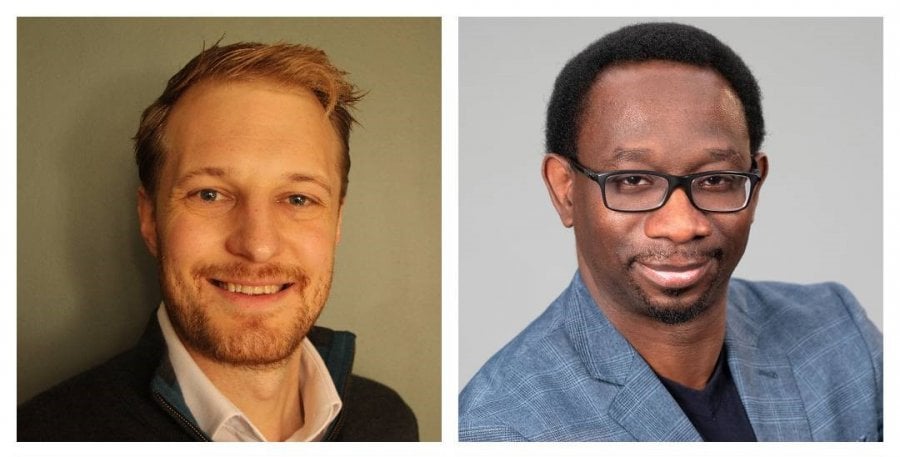TB Centre: Finn McQuaid and Toyin Togun
20 May 2021 London School of Hygiene & Tropical Medicine London School of Hygiene & Tropical Medicine https://lshtm.ac.uk/themes/custom/lshtm/images/lshtm-logo-black.png
Finn McQuaid (left), Toyin Togun (right)
How long have you worked at LSHTM? Can you tell us about your career journey?
Finn: “Four years. I am a mathematical modeller and work on various aspects relating to TB, including modelling to inform decision-making, drug resistance and digital adherence technologies. My current role is as the Secretariate Epidemiologist for the TB Modelling and Analysis Consortium. Previously I did a postdoc at Rothamsted Research on global food security, specifically infectious diseases of food crops. Before that, during my PhD, I worked on host-parasite interactions.”
Toyin: “I have worked at the LSHTM for upwards of two years now. My area of interest is developing novel strategies and approaches to improve the diagnosis of childhood TB in high burden settings. Prior to joining the School, I was a Steinberg Global Health Postdoctoral Fellow at McGill University in Montreal, Canada.”
What is your vision for the TB Centre at LSHTM?
Finn: “I would like the Centre to be more active in raising future TB researchers among students and early career researchers, as well as showcasing the work of some of the amazing people across the globe who are members.”
Toyin: “To contribute significantly to research and policy toward reducing the burden of TB globally.”
How can alumni learn more or get involved in the TB Centre’s work?
Finn: “Visit our website, particularly the list of projects, to get a better idea of what members are working on, or send us an email.”
Toyin: “We have regular bi-monthly seminars and annual flagship events such as the World TB Day Symposium and the Stephen Lawn Memorial Lecture. The TB Centre also has a very active social media presence and website. These are all avenues for alumni to learn more and get involved with the TB Centre.”
What are some of the biggest challenges facing the global TB response, and how can we overcome them?
Finn: “I think one of the biggest challenges facing us is a lack of urgency at a global level. Every year 10 million people develop TB disease, and 1.5 million die of TB. AMR is at the top of the global health agenda and drug-resistant TB accounts for a third of AMR-related deaths yet, the TB response remains cripplingly underfunded. Millions are undiagnosed with active TB, perpetuating ongoing transmission. Treatment requires months of taking potentially toxic medication, often accompanied by frequent trips to a healthcare facility. BCG, the only vaccine in routine use, is about to celebrate its 100th birthday while dozens of COVID-19 vaccines have been developed in the last year alone. TB is so rarely prioritised, but research has shown that a dollar spent on TB is one of the best investments you can make. As those in the field of TB, we need to be bold in advocating for this to change so that the world takes notice. We need to make sure that our voice is heard.”
Toyin: “Lack of financial investment in TB R&D is probably the biggest challenge facing the global TB response. This has impeded the development of new diagnostics, new TB vaccines and even new therapeutics. Overcoming this will need a global community to uphold the principles of equality and equity in research and decolonisation of TB research. We also need to hold political leaders and global health leaders accountable to promises made in terms of increasing investments in TB research, and for TB high-burden countries themselves to also increase their share of investments and contributions to leading TB research.”
What is your favourite thing about working at LSHTM?
Finn: “Working with so many people who care passionately about making the world a better place.”
Toyin: “LSHTM is a ‘mini United Nations’. It is multi-cultural and very international!”
How has COVID-19 affected your work?
Finn: “It’s had disruption on, for example, a trial we’re running. However, the main area has been thinking about what the impact of COVID-19 has been and will continue to be on TB, and what we can do to help mitigate that.”
Toyin: “COVID-19 caused significant disruptions and delays to medical research globally. The pandemic has impacted on the timelines of some of our ongoing research projects on childhood TB in West Africa.”
What are you looking forward to doing in the next year?
Finn: “Seeing friends and colleagues at some point (hopefully)!”
Toyin: “Promoting a broader and more inclusive participation in the activities of the TB Centre, which will build on the strength of the School, i.e. our presence and ongoing work in many countries in Africa.”